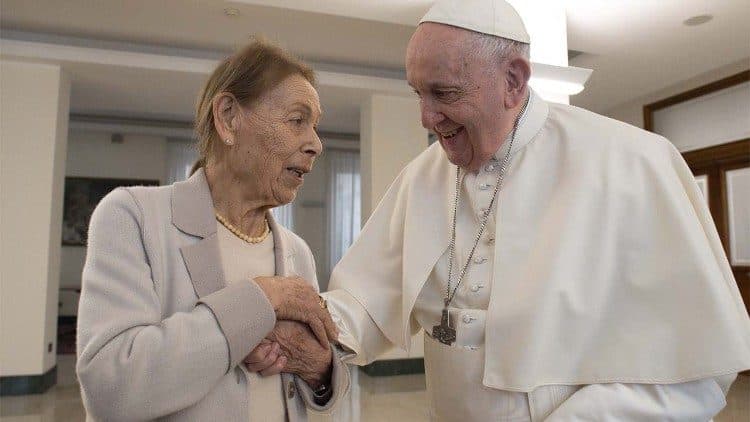ROME – A 93-year-old Holocaust survivor who once received Pope Francis in her Rome apartment, and who later wrote a book about the experience to which the pontiff contributed the foreword, has publicly criticized Francis for calling for investigations to determine if the conflict in Gaza meets the technical standards for a “genocide.”
“Genocide is something else. When a million children are burned to death, then you can talk about genocide,” Edith Bruck said in a Nov. 18 interview with Italian media.
Bruck, a Hungarian-born Jew and survivor of Auschwitz, Dachau and Bergen-Belsen, and who lost both parents and an older brother in the camps, said the bloodshed in Gaza is a “tragedy that concerns everyone,” but insisted that Israel is not attempting to wipe out the entire Palestinian population.
The only party to the conflict that’s spoken of genocide, Bruck said, is Hamas, which has vowed to destroy the Jewish people throughout the world.
The pope’s comments on Gaza came in recently published extracts from a new book devoted to the jubilee year of 2025, titled Hope Never Disappoints: Pilgrims Towards a Better World.
“According to some experts, what’s happening in Gaza has the characteristics of a genocide,” Francis said. “Attentive investigation is needed to determine if it fits the technical definition formulated by jurists and international organisms.”
According to Bruck, Francis uses the term genocide “too easily.”
Doing so, she said, “diminishes the gravity of true genocides … Genocide is what happed to the Armenians. Genocide is the million children burned in the ovens of Auschwitz, along with five million other Jews also burned in the concentration camps.”
Bruck said she does not mean to play down the reality of Gaza.
“I don’t want to dimmish the deaths of women and children,” she said. “No life matters more than another, and there are no first-class and second-class victims.”
Nevertheless, she insisted, Gaza “is not genocide.”
Bruck also pushed the pontiff to be more outspoken against what she called a “tsunami” of anti-Semitism washing across Europe.
“I’d like the pope to raise his voice on the subject, but I don’t hear it the way I’d like,” she said.
Bruck said Pope Francis calls her every year on her birthday, and said that if he calls again she’ll tell him personally what she thinks.
“I’ll tell him that I’d like him to intervene decisively against this hatred that’s broken out again against the Jews,” she said.
Born into a poor Jewish family in Hungary near the border with Ukraine, Bruck was sent in 1944 to Auschwitz, along with her parents, two brothers and a sister. The family moved through a series of camps until Bruck, her sister and other brother were liberated by the Allies at Bergen-Belsen in 1945.
After the war, Bruck first relocated to Israel but eventually settled in Italy and became a writer and director, in addition to a cultural point of reference as a Holocaust survivor.
In February 2001, Pope Francis visited Bruck in her Rome apartment after having been struck by an interview she had given to the Vatican newspaper, L’Osservatore Romano. The two conversed at length, and other meetings would follow, including one at the pope’s residence in the Casa Santa Marta for Holocaust Remembrance Day on Jan. 27.
Bruck later penned a remembrance of that first encounter, titled I Am Francis. In his foreword, the pontiff referred to Bruck as a “living memory,” whose witness of hope and faith can inspire us even amidst the “darkest abysses in the history of mankind.”
In her recent interview, Bruck said he’s afraid of the current rise in anti-Semitism.
“I’m saddened, demoralized, disgusted, scandalized and indignant,” she said. “I’m truly living a very ugly moment. Anti-Semitism, like fascism, is never dead. It’s millennia old, and I believe it will never end.”













